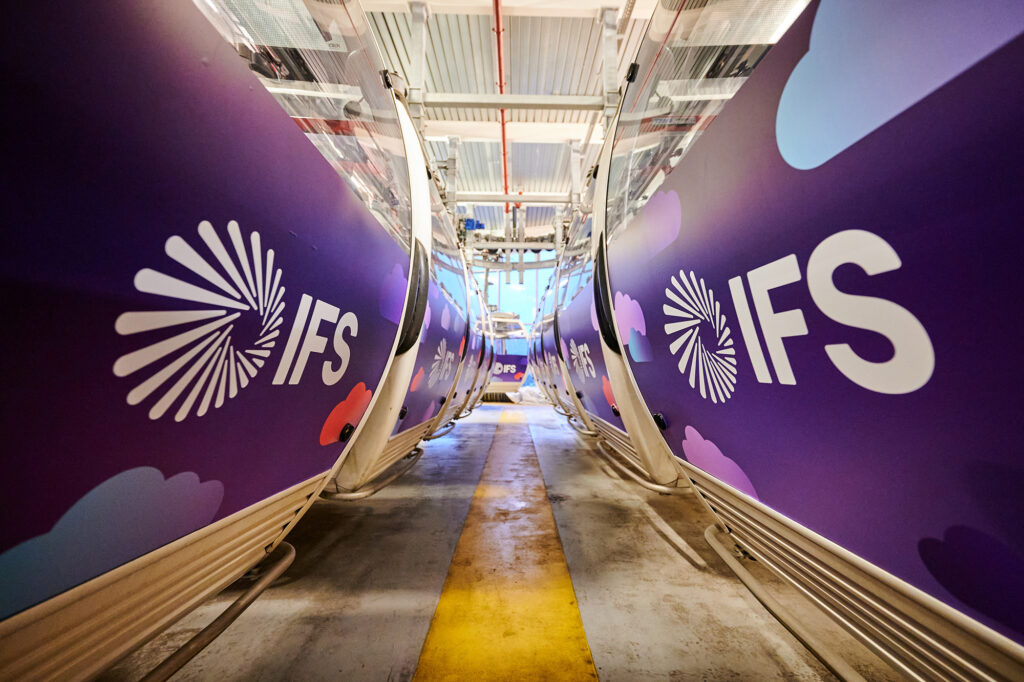IFS, enterprise cloud and industrial AI software provider, today announced at its IFS Unleashed event in Orlando, Florida that the Rolls-Royce Power Systems division, with its mtu brand, has chosen to implement IFS Cloud to optimize its global service operations and support its strategic objectives of efficiency, sustainability and growth.
As part of the transition of Rolls-Royce Power Systems to a solution-provider approach, the division, which has a workforce of over 10,000 employees, sought an innovative solution boost service-level agreement (SLA) fulfilment and enhance scheduling efficiency. Leveraging the power of Industrial AI, IFS Cloud will transform service operations with advanced real-time insights and dynamic scheduling capabilities. The aim is to streamline service workflows and deliver more precise and agile service to clients worldwide.
Rolls-Royce’s Power Systems division is headquartered in Friedrichshafen, Germany. The product portfolio includes mtu-brand high-speed engines and propulsion systems for ships, power generation, heavy land, rail and defense vehicles and for the oil and gas industry as well as diesel and gas systems and battery containers for mission critical, standby and continuous power, combined generation of heat and power, and microgrids and is intensively engaged in the development of climate-neutral solutions.
By using IFS Cloud’s Planning, Scheduling, and Optimization (PSO) module, the Rolls-Royce Power Systems division can expand long-term maintenance contracts and increase spare part sales by gaining better visibility into service data. This optimization will improve scheduling and engineer deployment, enhancing first-time fix rates while ensuring consistent fulfilment of SLAs across its fleet of engines.
At the same time, IFS Cloud’s simulation capabilities, delivered through its What-If Scenario Explorer (WISE) will significantly enhance the customer’s planning processes. By modelling various scenarios for resource allocation, maintenance scheduling, and capacity planning, it can anticipate challenges, optimize resource utilization and better align with SLAs. Moreover, simulating different ‘what-if’ situations, such as fluctuations in demand, technician availability or parts supply, will enable the Rolls-Royce Power Systems division to make proactive, data-driven decisions.
Rolls-Royce is not alone in its aspiration to become more data-driven. The modern data-driven enterprise can be described as an organization that prioritizes the use of data as a fundamental element of its strategic decision-making processes. Defining attributes include the following:
- Data sets are consolidated into a unified architecture to provide a comprehensive view
- Employs advanced analytical tools and technologies to extract insights from data
- Culture of data literacy
- Decision-making processes are predominantly based on data analysis
- Adopts predictive analytics to forecast future trends and behaviors
- Data governance frameworks are in place to ensure data quality, privacy, and compliance
Joern Lindstaedt, VP Global Customer Service – Power Systems, Rolls-Royce, said: “After speaking with various potential partners, it was quite clear that IFS Cloud’s capabilities would mark a significant step in transforming our service operations, and IFS was therefore, the clear choice. With enhanced real-time insights and dynamic scheduling, we expect to achieve substantial improvements in service delivery and customer satisfaction, supporting our goals for efficiency and sustainability.”
Automating much of the planning and dispatching process reduces the need for manual interventions, allowing new dispatchers to quickly master resource allocation, manage service appointments and adjust schedules.
James Lewis, global head of service management business unit, IFS, said: “We’re excited to partner with Rolls-Royce Power Systems to support their shift toward a more service-oriented business model. With IFS Cloud, they will be able to improve first-time fix rates, reduce response times, and make more data-driven decisions, helping them deliver exceptional service to customers worldwide.”
IFS Cloud will also provide real-time insights into engine performance, resource availability, and service needs, allowing for more proactive management of maintenance and replacements across Power Systems’ global operations. The platform will be rolled out to 1,000 users across 1,200 locations in 175 countries, underlining Rolls-Royce’s commitment to delivering innovation and customer service excellence on a global scale.
What this means for ERP Insiders
Leverage the power of AI in planning functions. In demand forecasting, AI can analyze historical data, customer behaviors, market trends, and external factors to predict future demand more accurately. Machine learning models can adjust forecasts dynamically as new data becomes available, helping businesses better align supply with expected demand. By using AI-driven inventory demand forecasts, businesses can optimize inventory levels, reducing excess stock and minimizing stockouts. AI can also recommend safety stock levels, reorder points, and optimal purchase quantities, all while considering lead times and supplier reliability. Further, AI-driven algorithms can create optimized supply chain plans by considering multiple variables like cost, delivery times, and demand fluctuations. AI can model various scenarios (e.g., a supplier shortage or transportation delay) and recommend contingency plans to ensure smooth operations. In capacity planning, AI can help manufacturers or service providers assess future capacity needs by predicting workloads and customer demand, thus helping to optimize resource allocation (e.g., workforce, machinery, or materials) in advance to avoid bottlenecks.
Target scheduling improvements with AI. AI can optimize production schedules based on available resources, machine availability, and deadlines. It can minimize downtime and machine changeovers by analyzing production workflows and identifying the most efficient sequence of operations. Also, AI can create optimized employee schedules by factoring in employee availability, skills, preferences, and labor laws. It can balance workloads, reduce overtime costs, and ensure that the right personnel are scheduled for each task based on demand and skill matching. AI systems can adjust schedules in real-time based on changing conditions, such as machine breakdowns, unexpected demand spikes, or employee absences. This adaptability ensures that disruptions are minimized, and resources are utilized effectively. Finally, AI algorithms can optimize customer appointment times or delivery schedules, reducing travel time, fuel costs, and delays. They can also take into account customer preferences and traffic patterns for more efficient routing.
AI advances the greater cause of optimization. In both manufacturing and services, AI can allocate resources (e.g., machines, labor, raw materials) to the right tasks at the right times. By balancing resource constraints with production goals, AI can maximize throughput and minimize idle time. Also, AI can analyze production or operational processes to identify bottlenecks, inefficiencies, or areas where improvements can be made. For example, in manufacturing, AI can recommend changes in machine settings or workflows to increase productivity and reduce waste.





